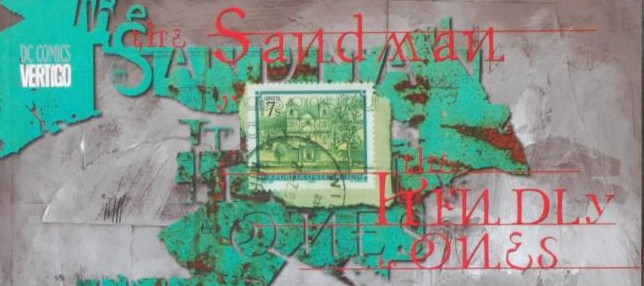I always remember Season of Mists as being better than it actually is.
It certainly has enough to recommend it. It’s ambitious in its scope and is full of big ideas. However, like a lot of Neil Gaiman’s work, it doesn’t quite wrap everything up in a satisfactory fashion. Still, though, it’s a pretty fun ride.

We finally get to meet the rest of The Endless! Well, minus the missing one. Destiny is about what one would expect and here, Delirium is a bit darker than she’ll be portrayed later (but her changeable nature is part of her character). I do feel like much of this prologue was just an excuse to get to the rest of them, though, and maybe serve as a quick entry point for readers just picking up this comic since each of The Endless gets a short text introduction.
Here’s the entire summary of this issue: Dream was a jerk for sending Nada to Hell. In ten thousand years, no one had told him this (nor did Dream realize it, but that’s to be expected). I don’t know how much Neil Gaiman planned this story out when he first introduced Nada, but Dream’s decision to free her from Hell does feel like an attempt to correct something that always came across as a bit problematic.
Instead, Lucifer decides to quit and empty out hell. There’s a lot of speech-making and philosophizing from Lucifer as he justifies his decision. It’s very wordy and not nearly as deep as it thinks it is (especially to me now — as a teenager, I didn’t mind it as much). He then gives Dream the key to Hell so he gets to decide what to do with it.
The whole misdirection of “Dream goes to fight Lucifer but there’s no battle” isn’t necessarily a bad one and I assume most of this was plotted out beforehand, but this is where Season of Mists falls into the “cool ideas, poor execution” trap. Because then the story changes gears once again and various gods and entities and other creatures come to compete for the key to Hell. Two angels also show up to observe
Mostly, this just feels like Gaiman’s desire to show off his knowledge of world mythology. Admittedly, there are some fun things here — I like that his Thor is a drunken lunkhead and Bast rejects his very crude advances. It definitely has plenty of the dark whimsy I associate with The Sandman. The subtle shifts in art to suit each of the gods or entities is a clever visual trick that only comics can really pull off.
Ultimately, though, none of this matters because The Creator he’s going to take over the control of Hell and now the two angels are its masters. Really, we spent three issues of banquets and bargaining and … that’s it? That could’ve happened three issues ago.
I do like Chapter 4, which is a side story set in a boys’ boarding school as the dead are returning from Hell. Charles Rowland is there on his own and has to deal with all manner of cruel dead classmates. It’s a great piece of haunted house horror and I like Charles and Edwin setting out on their own, despite, you know, being dead.
I like the diversity of art in The Sandman, but this has some of the roughest art so far in the series. It starts out great and then goes downhill. I don’t really know why. It’s still a lot of Kelley Jones, Malcolm Jones III and Mike Dringenberg. Some of the guest artists — including Matt Wagner and P. Craig Russell — are great usually, but I think often it comes down to a mismatch between pencillers and inkers. (I also suspect there were some scheduling issues that meant some people needed to fill in.)
Nada is eventually freed and she’s still angry (rightfully so) and it’s a satisfying touch that she slaps Dream (it was the least of what he deserved). It’s good that Dream (eventually) saw the error of his ways, even if it was very much too late.
I think The Sandman meant well when it came to diversity and race, but Nada’s imprisonment was something I’m glad the comic reckoned with. I have no idea if that was something that was planned from the beginning but it was still necessary.
While it is mostly adequate in its storytelling, Season of Mists has enough pleasures that it makes me overlook its flaws. I will probably continue to remember it’s better than it is and I think that says it all.




